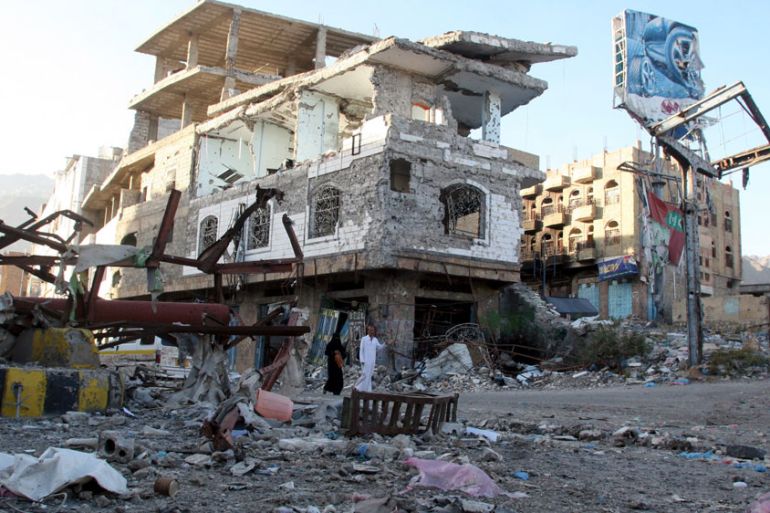Deadly fighting breaks out in Yemen ahead of ceasefire
At least 20 killed in battle between forces loyal to exiled government and Houthis before truce was due to take effect.

Fighting has broken out north of Yemen’s capital, Sanaa, and in the centre of the country, killing more than 20 people, hours before a truce was due to come into force to facilitate peace talks.
Heavy battles flared between forces loyal to President Abd-Rabbu Mansour Hadi and Houthi fighters in al-Maton, north of Sanaa, residents said on Sunday.
Keep reading
list of 4 itemsYemen inaugurates new presidential council
The War in Yemen | Start Here
Israeli troops kill Palestinian teenager in occupied West Bank
The is going to respect a ceasefire in Yemen starting from midnight Sunday at the demand of President Hadi but reserves the right to respond
In the central Bayda province, battles in the districts of al-Sawadiya and al-Zaher killed more than 20 people, local officials and residents said, and fighting continued in the southwestern city of Taiz.
But the Saudi-led coalition fighting Houthi rebels for more than a year said it would honour a UN-brokered ceasefire from midnight (2100 GMT) on Sunday.
“The Arab coalition is going to respect a ceasefire in Yemen starting from midnight Sunday at the demand of President Hadi but reserves the right to respond” to any rebel attacks, it said in a statement carried by AFP news agency.
On March 23, the UN’s special envoy Ismail Ould Cheikh Ahmed said the conflicting parties “have agreed to a nationwide cessation of hostilities beginning April 10 at midnight in advance of the upcoming round of the peace talks, which will take place on April 18 in Kuwait”.
Cessation of hostilities
The UN hopes the cessation of hostilities will lead to a more concrete, formal ceasefire with confidence-building measures.
This will be the fourth ceasefire since March 26 last year when the Saudi-led coalition began air strikes to support the government of Hadi, who fled an advance by Shia Houthis and their allies, elite troops loyal to former president Ali Abdullah Saleh.
Previous ceasefires failed to take hold and negotiations collapsed.
The war has killed more than 6,200 people, drawn in rival regional powers Saudi Arabia and Iran and triggered a humanitarian crisis in one of the Arab world’s poorest countries.
|
|
| A breakthrough in Yemen? |
In the capital, controlled for the past 18 months by the Houthis, residents said they desperately wanted this attempt at peace to succeed after two rounds of talks failed last year.
“I am tired of the fighting, the destruction, everything,” Hussein Ali, a 57-year-old government employee, told Reuters news agency.
“The situation is very difficult for people without work, without electricity, without water, and with the fear that, at any moment, bombardment could kill those dear to us.”
Hadi met his advisers in Riyadh on Sunday, Yemeni officials said.
They said the Houthis had not yet informed the UN about their latest position on the agreement to stop fighting. A spokesman for the Houthis could not immediately be reached for comment.